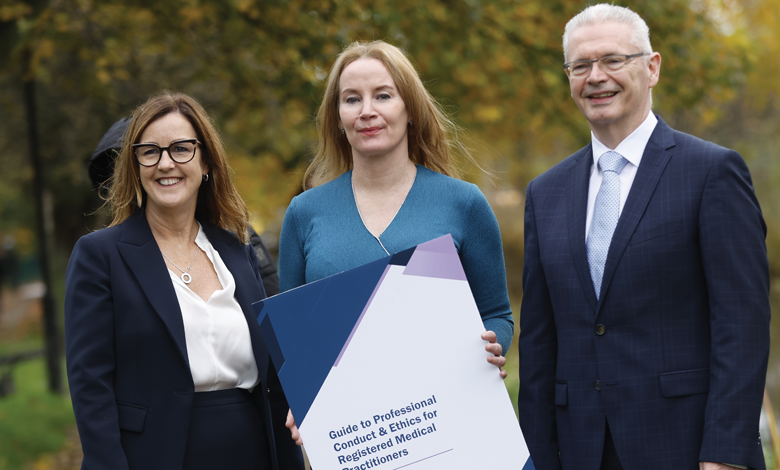Partnership between patients and doctors more critical than ever

Medicine has innovated exponentially in recent years. Progress in vaccines for pre-teens to protect against cancer, evolution in artificial intelligence (AI), robot nurses, and organ transplants all stand out as milestones to celebrate, writes Suzanne Crowe, President of the Medical Council.
The way in which doctors care for patients has also had to keep up with the ever-evolving demand for digital services. In Ireland, telemedicine has soared in popularity with those aged under 50, with around one-in-four (24 per cent) of adults accessing these services, including 21 per cent who have used GP services through telemedicine, a marked increase from 2 per cent in 2020. Telemedicine is just one novel way of enhancing access to health and GP services.
Advances in tech, digital tools, and automated services can and do support greater access to healthcare, but with these advances comes a new set of challenges, which are continuing to emerge with the rise in telemedicine, social media use, and AI.
While communication often is considered a ‘soft skill’, its value – particularly in the context of providing patient care – cannot be overstated. Medical Council research conducted in August 2023 asked the public what being treated as a partner in healthcare in a medical setting would look like to you. Communication-related themes emerged prominently, with 15 per cent stating communication and clear explanations are most important, while 11 per cent referenced being listened to and taken seriously.
That is why it is critical for patients and doctors to ensure that the basic principle of a healthy partnership remains central to the patient-doctor relationship.
Guidance for medical practitioners
With this in mind, the Medical Council’s nine edition of its Guide to Professional Conduct and Ethics for Medical Practitioners (the Guide) will launch in January 2024. It reflects the most current, pertinent, and inclusive guidance on a wide range of scenarios that impact doctors and patients.
A partnership is not dependent on perfection, rather, a partnership rests on clear communication, listening to each other’s views and respecting those views. In preparing the ninth edition of the Guide when the Medical Council asked the public what kind of interactions they wished to have with their doctors, it was partnership that they asked for. This message is supported by the many contributions we received from patient advocacy groups, who requested respect for patient autonomy and choice.
The Medical Council also took steps this year to identify individual groups of doctors whose voices are not as clearly heard, for example, international medical graduates, doctors seeking refuge from war, and doctors from minorities.

The World Health Organization (WHO) reports that when patients are treated as partners in their care, significant gains are made in safety, patient satisfaction, and health outcomes. By sharing their concerns, expectations and experiences of safe and unsafe care, patients are a vital source of learning and improvement. By becoming active members of the healthcare team, patients can not only contribute to the safety of their own care but also that of the healthcare system as a whole.
Patients and families should be involved at every level of healthcare, from fully informed consent and shared decision-making at the point of care, to policymaking and planning.
Recommendations for patients
To enhance safety and the overall experience, in their discussions with doctors, patients should ask their doctor questions such as, ‘What do I need to know?’ ‘What do I need to do next?’ ‘What can I expect?’ ‘How will this help me?’
Being an active partner in your healthcare involves taking important steps to improve your own physical and mental wellbeing. Resources and tools are available from Healthy Ireland and various other groups, which can assist you in becoming more active, reducing your alcohol intake, stopping tobacco use, and promoting your own mental wellbeing.
The Medical Council’s Working in Partnership with Your Doctor booklet explains the different types of doctors that might treat you, what you can expect from them and how you can work with them to improve your care. If patients equip themselves with this knowledge, they can actively contribute and ensure their voices are heard.
We would also encourage patients to check the medical register for peace of mind as to whether or not the doctor they are going to see is authorised to practise medicine in Ireland, especially if this is a doctor who has not treated you before.
Minority groups such as the elderly, migrants and refugees, and members of the Traveller community can be vulnerable and may face unique healthcare needs. There are many national health action plans in operation to support these communities. Doctors should not only acknowledge that these communities may have unique needs, but also develop empathy and an understanding of the challenges faced and help these patients to feel safe and heard in the healthcare environment.
With the increasing number of doctors registering with the Medical Council year on year, we are also seeing an increase in doctors from diverse backgrounds. This should be celebrated – people from diverse backgrounds have the potential to positively influence the wider healthcare environment and society.
Partnership across all avenues
The principle of partnership is not solely relevant to the patient-doctor relationship.
A framework for medical workforce planning should strategically consider and identify actions that will improve doctors’ working conditions, resulting in a fit-for-purpose medical workforce that ensures high-quality patient care and safety.
Effective and strategic workforce planning can only be achieved through concerted collaborative working amongst policymakers, educators, planners, and employers, including the Department of Health, the HSE, the Forum of Irish Postgraduate Medical Training Bodies and Medical Schools.
Suzanne Crowe is President of the Medical Council, and a consultant in paediatric intensive care in Children’s Health Ireland Crumlin. She is also a board trustee for LGBT Ireland, Cheshire Ireland, and The Down Syndrome Centre.
The Medical Council maintains the Register of Medical Practitioners – the register of all doctors who are legally permitted to undertake medical work in Ireland. The Council also sets the standards for medical education and training in Ireland. It oversees lifelong learning and skills development throughout doctors’ professional careers through its professional competence requirements. It is charged with promoting good medical practice. The Medical Council is also where the public may make a complaint against a doctor.
W: www.medicalcouncil.ie





